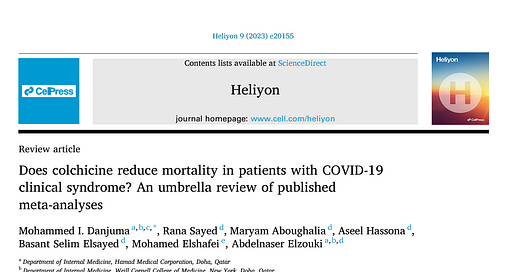Colchicine Reduces Mortality in Acute COVID-19: Umbrella Review of Published Meta-Analyses
18 Meta-Analyses--32% Reduction in Mortality
By Peter A. McCullough, MD, MPH
During the early years of the pandemic the real front line was comprised of independent clinics and urgent care centers as major university hospitals offered no ambulatory protocols or programs to keep patients out of the hospital.
Operation Warp Speed was too slow in the development of therapeutics with the exception of intravenous monoclonal antibodies, and later Paxlovid and Mulnupiravir as fairly unimpressive oral additions to the McCullough Protocol.
Most of the interest amongst physicians on the front line was the use of widely available generic medications. We had many small unfunded studies and occasional randomized trials, but not to the size needed to be conclusive. Such a trial for acute COVID-19 for a drug would need to have >20,000 patients and a primary endpoint of adjudicated COVID-19 hospitalization and death. Thus with only small trials the only tool left is meta-analysis, a method of combining studies to evaluate the pooled effect size. When there are many meta-analyses, they again need to be summarized. Gosling et al state:
Umbrella reviews (sometimes called ‘overview of systematic reviews’, ‘overview’, ‘review of reviews’, etc) are a new type of meta-evidence synthesis that has emerged in recent years to provide a bird’s eye summary on a wide body of evidence on a determinate topic.5 6 Overall, umbrella reviews provide a single document that synthesizes an extensive body of information that could not be generated within a single publication for feasibility reasons and that direct readers to the current best evidence.
Danjuma et al performed an umbrella review of the meta-analyses summarizing the oral colchicine trials in acute COVID-19. Colchicine has been in the McCullough Protocol since 2020. The authors main findings were:
We included eighteen meta-analyses (n = 199,932 participants) in this umbrella review. Colchicine exposure was associated with an overall reduction of about 32% in the risk of mortality (odds ratio 0.68, confidence interval [CI] 0.58-0.78; I2 = 94%, p = 0.001). Further examination of pooled estimates of mortality outcomes by the quality effects model (corrected for the methodological quality and risk of bias of the constituent reviews) reported similar point estimates (OR 0.73; CI 0.59 to 0.91; I2 = 94%).

This is great news for those who were prescribed and took colchicine during the acute phase particularly early in the pandemic. The drug reduces inflammation in the chest an is commonly used now for myopericarditis, long-COVID, and other vaccine injury syndromes. Colchicine has a well-characterized safety profile.
Please subscribe to Courageous Discourse as a paying or founder member so we can continue to bring you the truth.
Peter A. McCullough, MD, MPH
President, McCullough Foundation





I struggle to read and understand the graphs and stats unfortunately. However, how come there are rules and guidelines on viewing trial results for this drug, when it appears the trials and issuing of the jabs could be fast tracked and not even tested properly? Narratives again of the money and power hungry……. 😢
What is your current recommendation regarding daily dosing. The metanalyses of course have that data buried in the individual papers, and it is all over the place.
M Robert Weiss, MD